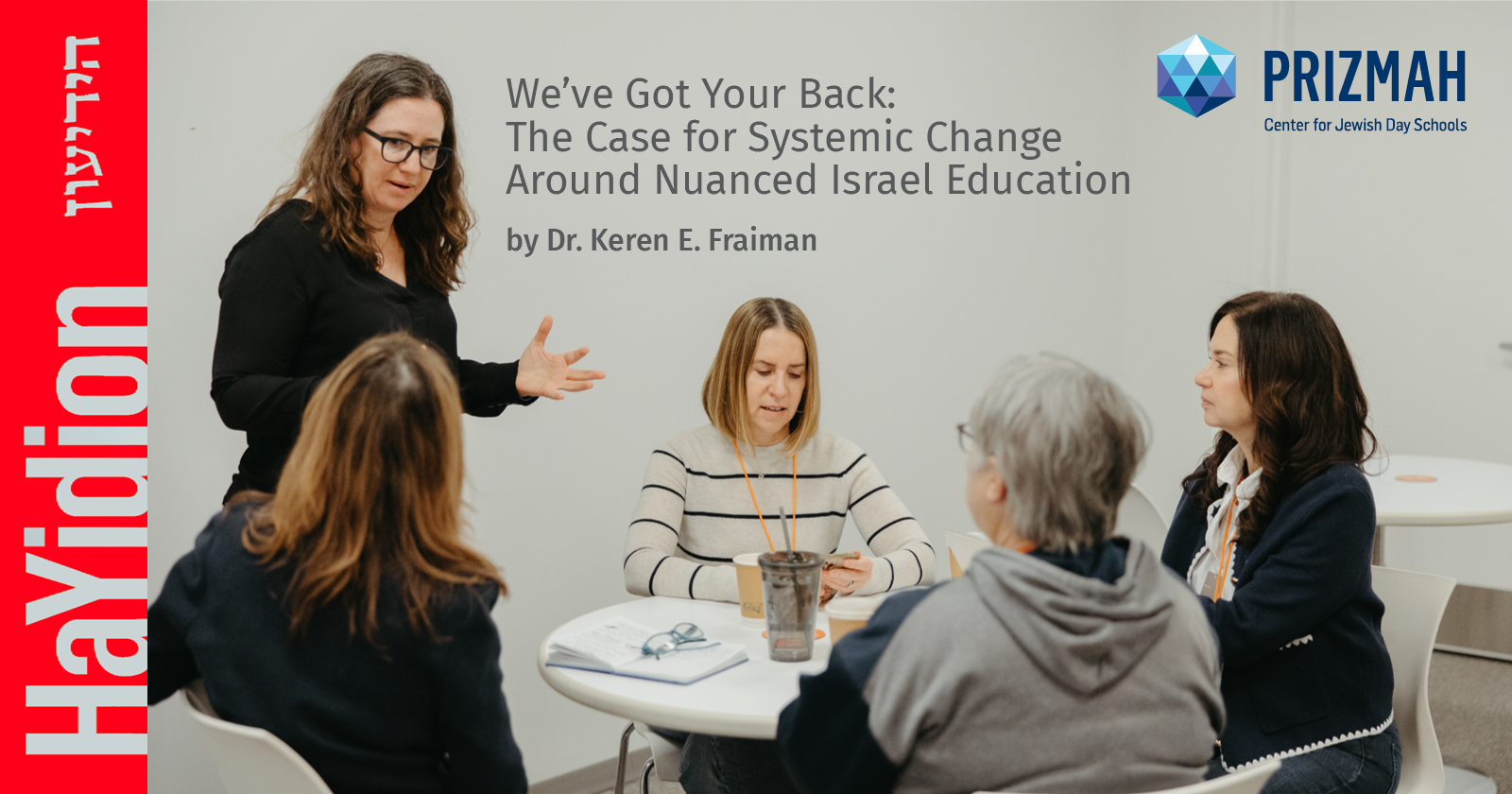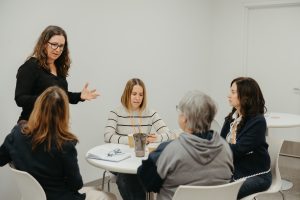
Authored by:
Dr. Keren E. Fraiman, Vice President & Chief Academic Officer, Spertus Institute
Originally published on the “Israel Education Now” edition of HaYidion: The Prizmah Journal on November 4, 2025.
Israel remains one of the most significant and complex topics in Jewish education and identity today. Since October 7, the Israeli-Palestinian conflict has become especially urgent and challenging, particularly for Jews in the Diaspora. While attention to the conflict has historically ebbed and flowed, in recent months it has dominated the news in multiple forms. This constant visibility has heightened polarization and intensified emotions within and beyond Jewish communities, leaving a profound and unprecedented impact on North American learners, often from a very young age.
From my conversations with educators across North America, one ultimate barrier consistently emerged: a lack of institutional and communal support for teaching about Israel and “the conflict.”
Israel education can—and should—thrive in a context that embraces multiple perspectives and even disagreements, as it cultivates essential skills such as critical thinking, empathetic listening and dialogue across differences. Educators understand this potential, but as a community and as a field of Israel education, we have not fully kept pace. Even when educators confront the barriers I identified in my research—education (feeling equipped with knowledge to teach a complex, ever-changing conflict), pedagogy (feeling prepared to lead conversations on controversial issues), and emotions (feeling confident managing highly charged discussions)—their success remains limited without the backing of institutional support.
While knowledge, pedagogy and emotions are primarily associated with the individual educator experience within their setting, the fourth category looks outside the “classroom” to include environmental factors beyond the educators’ control that impact their willingness to engage in conflict education. Even among educators who felt better prepared to address the first three challenges, this final category often emerged as a constraint on their teaching. In many cases, educators cited specific moments when they, or close colleagues, experienced a backlash from the community or lacked institutional support. These experiences, including receiving accusatory phone calls from parents, having a program canceled, or losing one’s job due to engaging in conflict education, significantly chilled these educators’ appetites for leaning into this work.
Their concerns were primarily centered around the relationship of the educator towards the administration or leadership of the institution, as well as the complexities of navigating parental responses. At times, the question of institutional support is about fear. At other times, it is about guidance. The conflict can be a dicey and politicized arena, so obtaining clarity and transparency about what is okay (or not okay) to teach is an important mechanism when managing a potential communal or parental “phone call.” These concerns are certainly intertwined, yet each presented different kinds of challenges. Ultimately, even educators who may be prepared and demonstrate readiness for engagement in controversial topics are far less likely to do so when the environment doesn’t support this kind of risk taking.
Regardless of whether the challenges that educators encountered stemmed from their interaction with the institution’s professional leadership, community leaders or parents, navigating these issues appeared to supersede any individual educator’s knowledge and skills, and consequently impacted their inclination to engage in conflict education. When educators felt that they lacked institutional or communal support, the risk of engagement felt untenable.
Regardless of the amount of individual training, if educators do not feel that their institutions “have their back,” they are unlikely to engage in difficult topics and conversations. Institutional support is the foundational issue we need to address if we are going to make substantive inroads towards teaching the next generation to engage more thoughtfully and holistically with Israel.
A Call to Action
One particular model of institutional support has stood out to me from all my educator interviews. An educator shared that in a previous role she held, every time she received an angry phone call, the principal stepped in and handled it, working to support her and allow her the chance to continue to do her work. The principal’s willingness to step in signaled to the educator that they had their back and trusted their work in the classroom, even when a parent or community member was upset. As a result, she felt supported and protected to engage in the kinds of nuanced conversations about the conflict her students demanded and deserved.
However, that was an exception that proved the rule. Time and again, I heard from educators who had experienced a supportive system only to then teach in another space where the support vanished. The result was that they were no longer willing to address the conflict in the classroom, even though they previously had felt empowered to do so.
While so many educators understand and can articulate the importance of conflict education, without support, it is our children who suffer the consequences. We can’t afford to continue to lose our children once they encounter hard questions about Israel in college and beyond that they are not equipped to answer or understand. We have a choice: to elevate our educators, or to silence them. It is also an opportunity for educators to manage up and to share with their institutional leaders what they need in order to engage in this work.
After all, the conflicts in Israel aren’t going away any time soon. Even when the politicians are inching closer to an agreement, the big emotions and complex questions over Israel continue and are only getting harder. This reality only makes our work more challenging—and also more urgent and important. The fact that Israel is both a core and a polarizing topic is precisely why we need to foster educational spaces that are welcoming of nuanced and complex conversations. There is room in our classrooms for many opinions and viewpoints, and while it may be scary, the consequences of not embracing this spirit of open dialogue are even scarier.
While there is undoubtedly fear and anxiety about what happens if we dive into these thorny issues, we should also have a healthy dose of concern about what happens if we do not. Learners need the opportunity to process the current realities within our institutions, and they will not have that chance unless we signal as a broader system that we not only think this is important but proactively support educators in this journey. This is a messy space, it is messy even when we get it right, and people will get upset. That is the nature of deeply challenging conversations.
The challenge is not merely to shield educators from these communal pressures, but to actively support and elevate their work. We need to stand beside them and create an environment that says, “We expect it to be messy, but it is better to navigate this mess within the walls of our educational and communal institutions.” To be clear, standing idly by will not prevent our youth from engaging with the complex parts of Israel, but it will leave them less well prepared when they engage with it in an unguided and unsupported manner. If the next generation is left to figure out what they think and feel on the proverbial playground, including the realm of their social feeds, they will discover a place that unquestionably is not conducive to nuanced education and asking critical questions.
Training Leaders to Support Teachers
Now is the time for us to come together, as community leaders, Jewish federations and school administrators, to encourage and strengthen institutions to support our educators to engage in these important topics.
To achieve these objectives, we need to provide avenues for lay leaders and professionals to nurture the leadership skills required to navigate the political arena of Israel education and conflict education more specifically. This opportunity would allow them to identify their goals and craft a plan for communicating their support to their educators. Opportunities for lay and professional leaders to discuss, debate and determine their own position(s) on these issues, as well as critically and courageously explore multiple narratives and perspectives, would create a far more permissive and supportive environment for educators themselves. Empowering educational leaders to reimagine this space will help educators meet the needs of young Jews who demand that we bring these conversations into our settings.

At my own institution, Spertus Institute for Jewish Learning and Leadership in Chicago, we have made an intentional shift in our educational approach, offering more training directly to lay leaders, board members and funders in order to enhance their understanding of the critical role they play in supporting professionals as they navigate challenging moments around Israel. We teach the same content to lay leaders as we do to professionals, tailored to their roles and responsibilities, so that they can emerge from our classes using the same language and playbook as the professionals they support. This is one of our ways of contributing to the systemic change we need.
Educational leaders also need the same kind of support noted above. Day schools are such important spaces for learners to explore their full relationship to Israel and be vulnerable around questions and ideas that they have. However, our day schools operate within systems that sometimes inhibit or interfere with the ability of educators to bring the best education to our learners. The fears and pressures around Israel can stifle the work of educators. We must imagine a different space in which parents, lay leaders and the broader community create a permissive and supportive environment for our educators so that our learners can have the opportunity and safety to explore the tough things.
The third leg of the stool for systemic support is parent education. Creating opportunities that engage parents is fundamental to the partnership model that is required for successful engagement in conflict education. Parent education should focus explicitly on the what and the why of conflict education. This approach would provide space for learning about many of the same issues their children are thinking about and engaging with in their settings.
Equally important is explaining to parents why this type of education is essential for their children to experience in their Jewish settings, even, or perhaps especially, when some of the opinions presented may not fully align with their own. Schools need to help parents better understand the educational and pedagogical benefits of engaging with complexity, and assuage their concerns, whatever they may be, about the potential damaging impact of this type of educational experience on their children. In this spirit, the Miami Jewish community recently launched the Teen Israel Academy, with sessions for teens as well as separate sessions for their parents. In leading this initiative, I have seen firsthand the value of educating parents and of creating opportunities for parents and their teens to connect in deeper, more open and more meaningful conversations, making both more open to complex and nuanced discussions at school and beyond.
Ultimately, whatever the outcome of the current ceasefire and peace plan, we cannot wait before we grapple with these important issues together, as professionals, lay leaders and parents. At this critical juncture, our learners demand more from us.
____________________________________________________________________________________________________________________________________
Read HaYidion: The Prizmah Journal articles written by MAJPS student Josh Schalk and CJL alumna Orly Rachamim here and CJL alum and LCCA student Eric Leiderman here.
